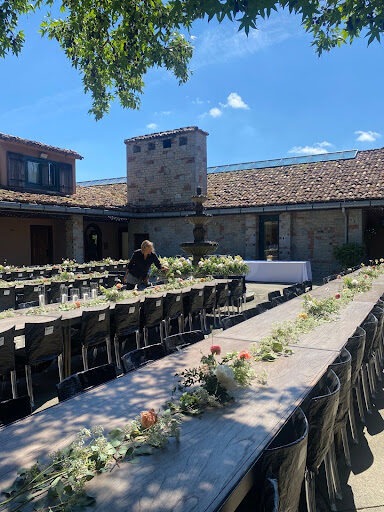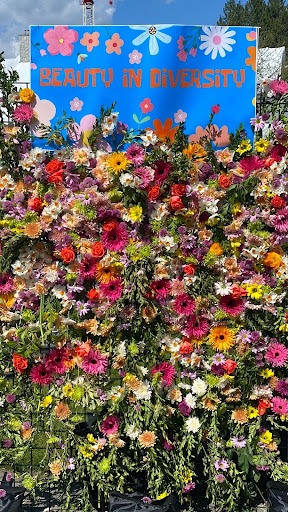Just a tight 10 days before the wedding, the bride’s aunt reached out to ask…
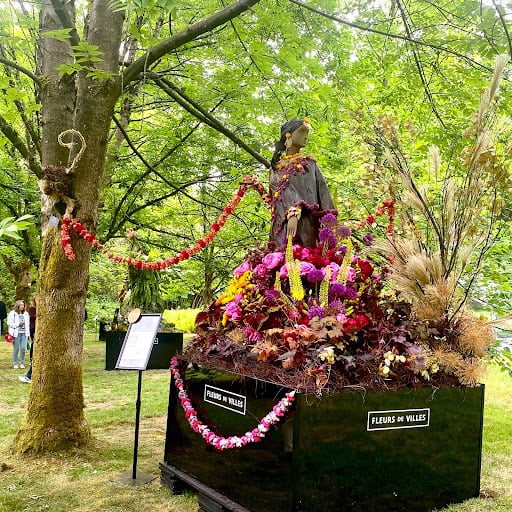

Creating an award-winning floral installation
Floral Designer, Lexi Richards, discusses her recent award-winning floral couture installation at Fleurs de Villes VOYAGE:
Everything I learned about creating a floral couture installation, I learned in kindergarten.
Living Plants
We learned in kindergarten that fresh flowers need water and dried flowers don’t. Fresh flowers without water will die, ugly or gracefully depending on the situation. Knowing that this display at the Fleurs de Villes Exhibit in Van Dusen Gardens in Vancouver, BC, had to last for 10 days, I chose to do the entire upper body with dried flowers (or fresh product that would dry nicely in place). I chose to feature the iconic sari of India, which displays the intricate embroidery and block printing in vivid colours, echoing motifs from nature. For the dress, I chose fresh cut flowers (in large, obscured, black buckets) and a couple of dozen potted plants on the platform.
Colour
What happens when you mix too many colours? A smart kindergarten teacher will not give you too many options at once. We all had a chance to figure that out! I chose burgundy as my foundation colour for a number of reasons: if the foliage dried it would look okay, it would showcase the peonies nicely, and it would be a nice contrast to the predominantly green gardens. We also learned intuitively through exploration that complementary colours pop when placed next to their counterpart. So the yellows and oranges really sing!
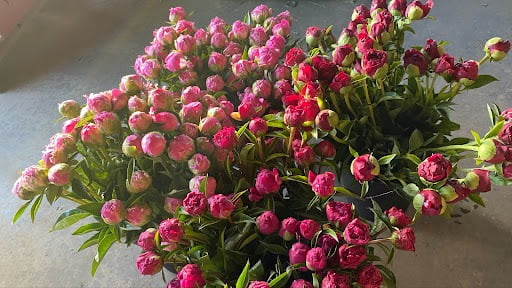

Seasonality
As luck would have it, this exhibit was smack-dab in the middle of peony season, so choosing them as our primary flower was a no-brainer. The trick is to use ones that are in a tight bud stage. We tucked them in close together so that they opened gradually over the 10 days and when they’re ready to shatter, the petals have nowhere to fall!
Stringing a Garland
Remember making a macaroni shell necklace or stringing beads in kindergarten? I chose imported carnations in fun, bright colours to mimic the classic marigold garlands of India. It was super easy and we were able to make use of the nearby tree. Which leads me to my next point…
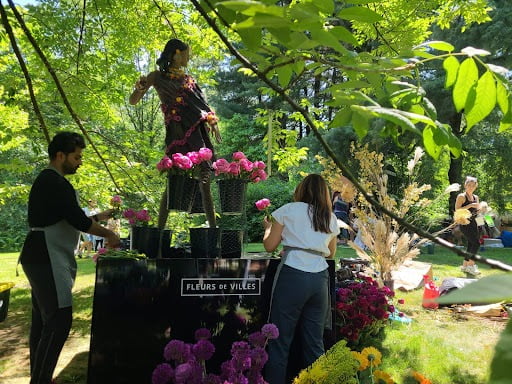

Resources
Remember building blanket forts as a kid? We all quickly learned about how gravity works, learning to tie a knot or rigging things up. Improvisation is paramount. Use the resources available to you, while respecting the rules of the space.
Gravity
Because this exhibit was outdoors, it made a mannequin wearing a ‘dress’ way heavier than real clothes. We chose very light products for the upper body and put a heavy sandbag on the pedestal. We placed the buckets in tight formation, cinched with chicken wire and tomato cages as armature, and let the tall dancing flowers like foxtail lilies, defy gravity for us!
Costume design
Remember dress up? My biggest challenges on this project was creating a head of hair made out of tropical Ti leaves on a very smooth, round head. Creating a metal headband did the trick. Draping the sari shawl was also more challenging than we thought. Pro tip: fabric on the bias gives you the best drape!
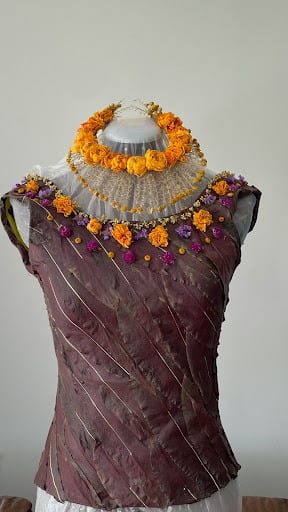

Glue
I used spray adhesive for the large panels of the dress, and cold glue for the embroidery of blooms. Just like kindergarten, glue sticks on everything! Period.
Sharing
Taking on a project of this magnitude at such a short notice required me to lean out of my comfort zone. Channel your inner kindergartener and ask a lot of questions and ask for a lot of help. The ‘day of installation’ labour was 36 hours with a team of 4, including 2 amazing floral designers each giving 10 hours of their time and talent! It was truly a collaborative, collective, creative effort.
Animals
We all love animals. Especially ones with googly eyes! So I created a monkey out of a succulent plant and and a very long curly tail out of dried grasses.The googly eyes were created out of Lunaria pods and Hypericum berries. The monkey was up in the tree, ‘helping’ hang the garland.


Humour
Interjecting the story with a bit of humour with the monkey in the tree allowed us to take things less seriously… and having three helpers who are cracking jokes all day long and laughing helped me lighten up!
Snacktime
Just like kindergarten, regular nourishment is a critical component and when shared, it starts feeling like a party!
Nap Time
As a floral artist, part of my work-life balance is having an afternoon nap, just like kindergarten. That’s when I get my most creative downloads. (Unfortunately, I couldn’t take a nap on the day of the event!) One of my brilliant ideas during the planning stage was to create a framework to elevate the florist bucket by inverting a tomato cage. It worked like a charm! We are never too old for innovation!
Water
We learn so much about this topic in kindergarten: we drink it, we spray it, we water flowers with it, we spill it…ahem, and we still managed to spill it! Duh!
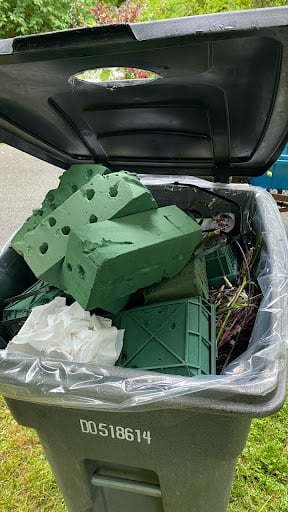

Clean up Time
A a floral designer, it is important to me that the end product is created sustainably, as it would be hypocritical to honour nature through art and then render it to garbage. It is part of our ethos and that too, has been instilled into me since kindergarten. Composting is straightforward, especially when you start with a natural product. I’m proud to say that no floral foam (single use plastic design medium sponge) was used! All the dried products were naturally dried without beach, preservative, dyes, or chemicals. The entire project was either re-useable, re-plantable, or compostable. Only the panels (glued fabric and botanicals) of the skirt, shawl, and bodice became garbage.
If anyone asks me: “how did I come up with this design?” I tell them everything I know, I learned in kindergarten!



